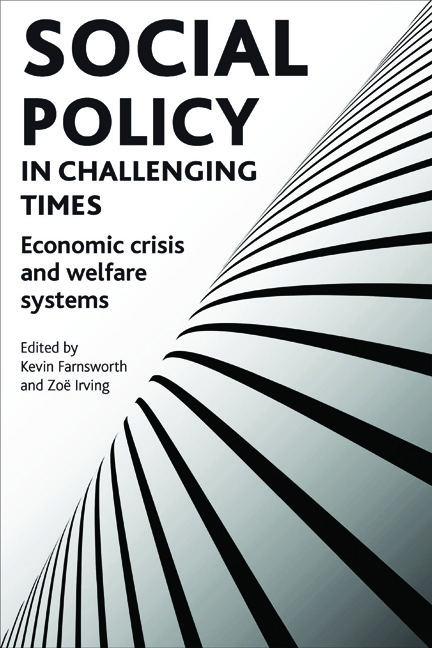Book contents
- Frontmatter
- Contents
- List of figures and tables
- Notes on contributors
- Acknowledgements
- one Varieties of crisis
- two The economic crisis and paradigm change
- three From financial crisis to fiscal crisis
- four Credit crunch, inequality and social policy
- five Global social policy responses to the economic crisis
- six Poverty, the crisis and social policy responses developing countries in developing countries
- seven South Korea after the 1997 economic crisis: a ‘paradigm shift’?
- eight China's response to crisis: what role for social policy?
- nine Tiptoeing through crisis? Re-evaluating the German social model in light of the global recession
- ten Ireland and the impact of the economic crisis: upholding the dominant policy paradigm
- eleven Waving not drowning: Iceland, kreppan and alternative social policy futures
- twelve Experiences from two financial crises in the Nordic welfare states: 1990-93 and 2008-10 compared
- thirteen Social policy and the recent economic crisis in Canada and the United States
- fourteen From economic crisis to a new age of austerity: the UK
- fifteen Responding to the challenges: some concluding remarks on welfare futures in changed circumstances
- Bibliography
- Index
fourteen - From economic crisis to a new age of austerity: the UK
Published online by Cambridge University Press: 07 September 2022
- Frontmatter
- Contents
- List of figures and tables
- Notes on contributors
- Acknowledgements
- one Varieties of crisis
- two The economic crisis and paradigm change
- three From financial crisis to fiscal crisis
- four Credit crunch, inequality and social policy
- five Global social policy responses to the economic crisis
- six Poverty, the crisis and social policy responses developing countries in developing countries
- seven South Korea after the 1997 economic crisis: a ‘paradigm shift’?
- eight China's response to crisis: what role for social policy?
- nine Tiptoeing through crisis? Re-evaluating the German social model in light of the global recession
- ten Ireland and the impact of the economic crisis: upholding the dominant policy paradigm
- eleven Waving not drowning: Iceland, kreppan and alternative social policy futures
- twelve Experiences from two financial crises in the Nordic welfare states: 1990-93 and 2008-10 compared
- thirteen Social policy and the recent economic crisis in Canada and the United States
- fourteen From economic crisis to a new age of austerity: the UK
- fifteen Responding to the challenges: some concluding remarks on welfare futures in changed circumstances
- Bibliography
- Index
Summary
As already noted in previous chapters of this volume (see especially Chapter One), the post-2007 economic crisis was a global economic event that had variable effects on national economies. How, and to what extent, it has had an impact depends on local circumstances: prevailing economic conditions and political responses. Thus, the global economic crisis can be better understood as a series of national economic crises, each being distinguished by the size of the initial economic hit and by the particular mix of political and economic weapons selected to defend national economies. And as we shift the focus to individual nations, the politics of the crisis become as, or even more, important than the economics.
For its part, the United Kingdom (UK) could scarcely have been in a worse position to mediate the effects of the global crisis as it took hold in 2007 and 2008. The UK's close economic relationship with the United States (US) meant that its financial sector experienced the repercussions of the initial collapse of the US sub-prime market earlier than many other economies and it was ultimately hit much harder. The knock-on effects on its housing market and manufacturing and services sectors have also been more prolonged. The particular confluence of UK political and economic factors prior to, and since, the onset of the crisis served to increase its effects; the UK economic crisis was especially deep and the early political response especially comprehensive (or to put it another way, especially financially costly). The crisis helped to unseat the Labour government in 2010 and paved the way for a new Conservative-led coalition government, which, in turn, introduced a more right-wing mode of crisis management (to which we will return later). This has been decisive in the evolution of the crisis and its impact on social policy in particular. In the UK, the crisis has ushered in a new age of welfare austerity.
Background to the UK crisis
Before we consider the UK crisis in detail, it is important to examine its context. As Chapter One made clear, the political economy of the crisis – its roots, how it took hold, where and how it has had an impact on economies and how it has been tackled and/or mediated – is hugely important (see Gamble, 2009; also Gough, this volume). The crisis that began in the US demonstrated at once the extent to which the UK and US economies were intrinsically tied together.
- Type
- Chapter
- Information
- Social Policy in Challenging TimesEconomic Crisis and Welfare Systems, pp. 251 - 270Publisher: Bristol University PressPrint publication year: 2011

